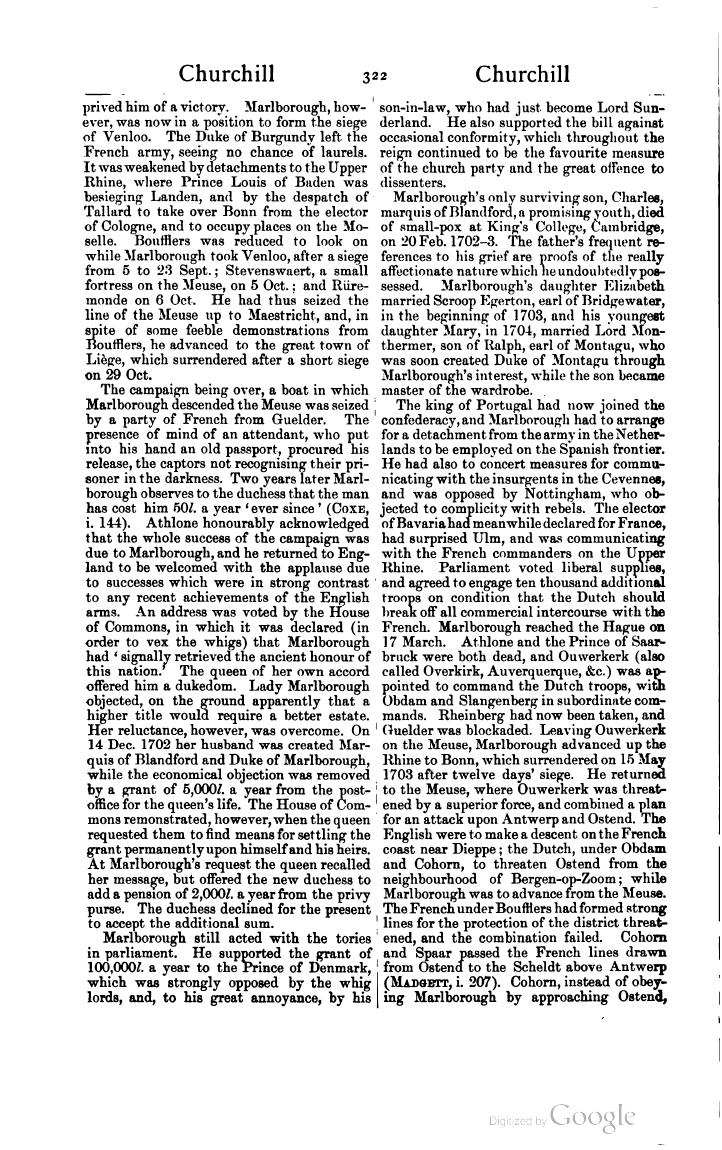prived him of a victory. Marlborough, however, was now in a position to form the siege of Venloo. The Duke of Burgundy left the French army, seeing no chance of laurels. It was weakened by detachments to the Upper Rhine, where Prince Louis of Baden was besieging Landen, and by the despatch of Tallard to take over Bonn from the elector of Cologne, and to occupy places on the Moselle. Boufflers was reduced to look on while Marlborough took Venloo, after a siege from 5 to 23 Sept.; Stevenswaert, a small fortress on the Meuse, on 5 Oct.; and Rüremonde on 6 Oct. He had thus seized the line of the Meuse up to Maestricht, and, in spite of some feeble demonstrations from BouFFlers, he advanced to the great town of Liège, which surrendered after a short siege on 29 Oct.
The campaign being over, a boat in which Marlborough descended the Meuse was seized by a party of French from Guelder. The presence of mind of an attendant, who put into his hand an old passport, procured his release, the captors not recognising their prisoner in the darkness. Two years later Marlborough observes to the duchess that the man has cost him 50l. a year ‘ever since’ (Coxe, i. 144). Athlone honourably acknowledged that the whole success of the campaign was due to Marlborough, and he returned to England to be welcomed with the applause due to successes which were in strong contrast to any recent achievements of the English arms. An address was voted by the House of Commons, in which it was declared (in order to vex the whigs) that Marlborough had ‘signally retrieved the ancient honour of this nation.’ The queen of her own accord offered him a dukedom. Lady Marlborough objected, on the ground apparently that a higher title would require a better estate. Her reluctance, however, was overcome. On 14 Dec. 1702 her husband was created Marquis of Blandford and Duke of Marlborough, while the economical objection was removed by a grant of 5,000l. a year from the post-office for the queen's life. The House of Commons remonstrated, however, when the queen requested them to find means for settling the grant permanently upon himself and his heirs. At Marlborough’s request the queen recalled her message, but offered the new duchess to add a pension of 2,000l. a year from the privy purse. The duchess declined for the present to accept the additional sum.
Marlborough still acted with the tories in parliament. He supported the grant of 10,000l. a year to the Prince of Denmark, which was strongly opposed by the Whig lords, and, to his great annoyance, by his son-in-law, who had just become Lord Sunderland. He also supported the bill against occasional conformity, which throughout the reign continued to be the favourite measure of the church party and the great offence to dissenters.
Marlborough's only surviving son, Charles, marquis of Blandford, a promising youth, died of small-pox at King's College, Cambridge, on 20 Feb. 1702-3. The father's frequent references to his grief are proofs of the really affectionate nature which he undoubtedly possessed. Marlborough's daughter Elizabeth married Scroop Egerton, earl of Bridgewater, in the beginning of 1703, and his youngest daughter Mary, in 1704, married Lord Monthermer, son of Ralph, earl of Montagu, who was soon created Duke of Montagu through Marlborough’s interest, while the son became master of the wardrobe.
The king of Portugal had now joined the confederacy, and Marlborough had to arrange for a detachment from the army in the Netherlands to be employed on the Spanish frontier. He had also to concert measures for communicating with the insurgents in the Cevennes, and was opposed by Nottingham, who objected to complicity with rebels. The elector of Bavaria had meanwhile declared for France, had surprised Ulm, and was communicating with the French commanders on the Upper Rhine. Parliament voted liberal supplies, and agreed to engage ten thousand additional troops on condition that the Dutch should break off all commercial intercourse with the French. Marlborough reached the Hague on 17 March. Athlone and the Prince of Saarbruck were both dead, and Ouwerkerk (also called Overkirk, Auverquerque, &c.) was appointed to command the Dutch troops, with Obdam and Slangenberg in subordinate commands. Rheinberg had now been taken, and Guelder was blockaded. Leaving Ouwerkerk on the Meuse, Marlborough advanced up the Rhine to Bonn, which surrendered on 15 May 1703 after twelve days’ siege. He returned to the Meuse, where Ouwerkerk was threatened by a superior force, and combined a plan for an attack upon Antwerp and Ostend. The English were to make a descent on the French coast near Dieppe; the Dutch, under Obdam and Cohorn, to threaten Ostend from the neighbourhood of Bergen-op-Zoom; while Marlborough was to advance from the Meuse. The French under Boufflers had formed strong lines for the protection of the district threatened, and the combination failed. Cohorn and Spaar passed the French lines drawn from Ostend to the Scheldt above Antwerp (Madgett, i. 207). Cohorn, instead of obeying Marlborough by approaching Ostend,
